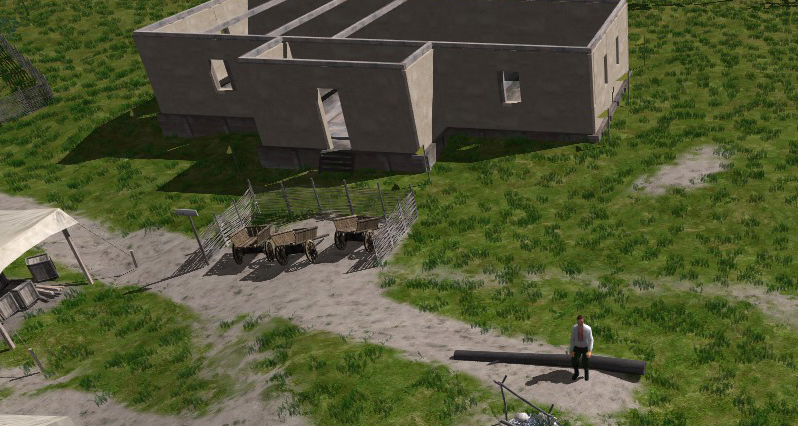I failed at this city-builder so badly all the citizens walked out of town and the game shut itself off
18th century city-building sim Ostriv is intricate and engrossing—and it knows I'm not good enough to play it.

Less than a year after it was founded, only two citizens remain in my little 18th century town. One is a fisherman, Vadým Demyanov, and one is his wife, Maríchka, who works at the market selling the fish her husband catches. There's no one left to sell the fish to at this point, but she stands there every day anyway, a real trooper. She's five months pregnant, and I'm eagerly awaiting the birth of baby Demyanov, which will be a blessed occasion for the couple and probably my only chance of my ghost town gaining a new citizen.
I've been playing Ostriv, a city-building sim that's the work of a single developer named Yevheniy, from Ukraine, who has been working on it since 2014. That's pretty remarkable, especially since it's got some intricate systems at work, and it's already one of my favorite city building games in terms of how enjoyable it is to watch as citizens go about their jobs and daily lives.
There's a lot of detail packed into Ostriv. I particularly like how buildings are constructed. Building a house requires wood (from the lumber mill), clay (from a clay pit), nails (from a smithy) and thatch. Building a lumbermill and assigning workers, you can watch them stride off into the woods and cut down trees, then carry the logs over their shoulders into the mill. When I build a thatchery by the river, the worker will walk down to the water and gather reeds, then turn them into thatch and stack them outside for laborers to transport to their jobsites.
When a house is built, people will move in—but first they'll transport all their belongings from the tent they were living in, pulling their goods along in a little wooden cart. Once they've fully moved into their new home, the tent they were occupying will vanish.
What's really neat is each building gives you a little project schedule: Showing the acquisition and delivery of the components, followed by the labor to install them, then the delivery of more materials. You can get a feel for what you need and when you'll need it to try to keep buildings going up without unnecessary delays. Ostriv is also gridless, so you plan your city exactly how you'd like, though some things can be snapped together—fences around adjoining homes and buildings like docks and boathouses, which snap into place along the riverbank.
Your villagers create roads simply by walking the same routes again and again, eventually wearing desire paths through the grass. (Another city builder I played, Foundation, also does this.) If paths aren't used for a while they will grow grass again. It all feels very natural and alive.
Watching the citizens can also clue you in to problems when they aren't doing what you expect them to. I build a fishing dock, and watch as the workers slowly bring over the supplies need to construct it, then hammer it all together. I assign a fisherman but notice he's not doing any fishing. It's because he needs a boat—this is a dock, after all. So, I build a boatyard along the same riverbank, watch that get built, assign a craftsman to it, and place an order for a boat. I watch as he trundles over a couple carts full of wood and hammers the boat together, and then—wonderfully—he climbs in and rows the boat over to the fishing dock. The fisherman then takes it out into the river and starts hauling in fish. The whole process is a complete pleasure to watch.
The biggest gaming news, reviews and hardware deals
Keep up to date with the most important stories and the best deals, as picked by the PC Gamer team.
Less of a pleasure for my growing little town is the arrival of its first winter. I knew Ostriv had seasons, but I wasn't aware how directly they'd impact my town. When December comes it brings snow, but it also freezes the river—meaning the fishing industry I just built can't be put into practice again until the spring thaw. Most importantly, it immediately cuts my town's population in half.
Anyone still living in a tent and not a house promptly abandons my town, and I was so busy building my fishing operation and staring happily at people carrying logs around that I didn't get enough houses built in time. It's too damn cold to sit in a tent, so my house-less citizens all just walk off over the frozen fields, presumably to a proper city.
So, pro-tip: if you play Ostriv, get those houses built as fast as you can.
This is a pretty serious problem. I have fewer workers so I need to start shuffling them between jobs regularly, and the women in town aren't allowed to work in most professions. It is the 18th century, though I wish I had the option to be a bit more progressive. I'm willing to sacrifice historical accuracy in exchange for getting some shit done and saving my town. Hell, I'd put children to work if I was allowed to. I've done it before, in Frostpunk, and only felt a little bit guilty about it.
With my reduced workforce, everything slows to a crawl. I'm desperately trying to get a town hall built for my mayor, and I'd like to get a farm house constructed so I can plant crops in the spring. Before I make much progress, a few more townsfolk stalk off across the frozen fields, and soon even my mayor quits. It's definitely not a good sign when the mayor would rather take his chances on the frozen frontier.
Eventually I'm down to just my two remaining citizens, Vadým the fisherman (whom I appoint as the new mayor) and his wife, Maríchka, still hopefully occupying the fishing industry's sales department. I desperately begin construction on a trading post, hoping to buy supplies from another city and maybe get the word out to the rest of the world that, hey, there's a town here with literally every single job available.
The trading post is massive, however, and with only Vadým available to build it, it's going to take roughly forever, as he'll need to do all the transporting and crafting himself while his pregnant wife stands around hoping a hungry bear with some cash happens to wander in. On their breaks, the couple sit next to each other on a log in the middle of town while I stare at them. I'm reminded of the time I built a city for a single family in Cities: Skylines, only this time it's not intentional.
Perhaps sensing the general vibe of impending failure, the couple eventually throw down their fish and begin walking away. Thanks to a tickbox that lets you see the path your citizens will take, I can see where the Demyanovs will exit my map, leaving me with a population of zero. So, I camp there with my camera and wait for them to abandon me.
They reach the edge of my map, and then the game simply closes. Don't let the desktop hit you in the face on the way out.
I feel, deep in my heart, that this was not a crash to desktop. This was the game deliberately closing itself. This was the game telling me, hey, Chris, you suck. You don't even get to return to the main menu. The main menu is for closers. Just go away and spend some time thinking about what you've done.
I'm not going to take the hint, though. I think Ostriv is a really neat sim, even in Early Access, and I'm determined to start over and make it through winter with more than just two unhappy citizens remaining. Next time, I promise, I'll have dozens of unhappy citizens.

Chris started playing PC games in the 1980s, started writing about them in the early 2000s, and (finally) started getting paid to write about them in the late 2000s. Following a few years as a regular freelancer, PC Gamer hired him in 2014, probably so he'd stop emailing them asking for more work. Chris has a love-hate relationship with survival games and an unhealthy fascination with the inner lives of NPCs. He's also a fan of offbeat simulation games, mods, and ignoring storylines in RPGs so he can make up his own.

